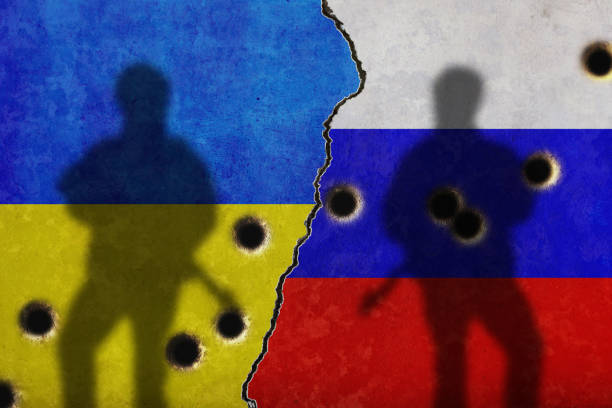On February 16, 2023, Russian opposition leader Alexei Navalny died at a penal colony above the Arctic Circle, marking a dark day for Russia. A Le Monde article was titled “Navalny’s death buries the last hope for a free Russia”. In 2020, Navalny was poisoned in Siberia by what German laboratories later confirmed to be the nerve agent Novichok. His return to Moscow on January 17, 2021, knowing that he would immediately be detained, was a remarkable display of courage and patriotism. Someday, in Moscow, Russians will pay him their respects before his statue.
Mr. Navalny’s death came at a critical point in the Russia-Ukraine conflict allowing Western leaders to charge President Putin with criminal conduct and make their case for sustained support to Ukraine.
For months, in early 2023, speculation over the Ukrainian spring offensive continued. Then there was some confusion about whether the offensive had begun or not. Finally, without any element of surprise for the Russians, it started. Some were highly optimistic. Others believed that a big push by Ukrainian forces that would give them full control over Ukraine’s internationally recognized territory was an unlikely outcome. The latter has proven right. Moreover, the US Congress has yet to agree on a new 60 billion dollars worth of aid package to Ukraine. Kyiv’s military supporters are experiencing a shortage of artillery shells, indispensable ammunition in grinding wars. Donald Trump’s recent anti-NATO outburst has alarmed Washington’s allies. And the US and some of its European partners are now involved in a most distracting second war in the Middle East making the “pivot to Asia” and winning over the Global South more difficult tasks.
Exactly three years ago today, President Biden addressed the global community for the first time. At the 2021 Virtual Munich Security Conference, he said, “I know — I know the past few years have strained and tested our transatlantic relationship, but the United States is determined — determined to reengage with Europe, to consult with you, to earn back our position of trusted leadership.” [i] Today, the future does not look as promising.
As the second anniversary of Russia’s invasion of Ukraine is approaching, six Brookings scholars shared their views on the future of the Ukraine conflict with the reader under the title “Does the West’s Ukraine policy need a reality check? A Brookings debate” [ii] According to my reading, none of them predicted a victory for Kyiv. Neither do I. They also said that neither Russia is winning the war. They advocated continued Western military assistance to Ukraine some stressing that it is up to the Ukrainian leadership to decide if and when to engage in diplomatic talks with Moscow. On the question of Ukraine’s membership in NATO, they agreed that this would take time.
As for the battlefield losses, on August 18, 2023, The New York Times reported that Russia’s military casualties, according to US officials, were approaching 300,000. The number includes as many as 120,000 deaths and 170,000 to 180,000 injured troops. The Russian numbers, reportedly, dwarfed the Ukrainian figures, which the officials put at close to 70,000 killed and 100,000 to 120,000 wounded. However, the officials cautioned that casualty figures remained difficult to estimate because Moscow is believed to routinely undercount its war dead and injured, and Kyiv does not disclose official figures.[iii] Last Saturday, Ukrainian forces withdrew from the strategic eastern city of Avdiivka.
Talking about victories and defeats, Russia suffered a historical defeat when the Soviet empire became history on December 25, 1991, when Mikhail Gorbachev resigned his post as the president of the Soviet Union, leaving Boris Yeltsin as president of the new Russian state.
As the Soviet Union became history, Western countries lectured Moscow on the merits of democracy and the free market. Russia implemented a radical privatization program encouraged by the West that paved the way for the Russian oligarchs. The fall in oil prices aggravated Russia’s economic challenges. GNP fell dramatically. Inflation reached record levels. Some former members of the Warsaw Pact crossed over to the “other side” in exercising what was their indisputable right under international law. Nonetheless, the West could and should have done more to alleviate Russia’s frustration and engage Moscow. The loss of an empire is more than a disappointment and its reverberations last.
On December 31, 1999, Yeltsin unexpectedly announced his resignation and named Vladimir Putin as acting president. Since then, Mr. Putin has ruled over Russia with an iron fist. Would Washington and its European allies have followed a different, more embracing policy towards Moscow had Mr. Gorbachev been succeeded by Alexander Navalny? I doubt it. They were victorious but even the unipolar world order or the new status quo that emerged after the collapse of the Soviet empire was just not good enough. Developments since then offer important lessons for relations with a post-Putin Russia.
Despite continuing Russia-West tensions, there are some references to the possibility of peace talks between Russia and Ukraine, however remote that may be.
Putting aside for a moment the likely repercussions of this year’s US presidential election for the war in Ukraine, what could be on the agenda if the parties to the conflict were to meet at the negotiating table rather than the battlefield?
Ukraine and its Western allies would certainly start by raising the issue of Crimea. Russians would not even talk about it.
Thus, the top two interlinked items would be the future of the territories occupied by Russia since February 24, 2022, and Ukraine’s membership in NATO.
Would Russia withdraw from those territories in exchange for written guarantees that Ukraine would never join NATO? No. Moscow would insist on keeping the territories it has occupied, perhaps with some border adjustments.
Would Moscow be prepared to give similar guarantees that it would respect Ukraine’s independence and territorial integrity? Only in return for written guarantees that Ukraine would never join NATO because Moscow has for long argued that after the collapse of the Soviet Union, it was given verbal assurances that the Alliance was not going to embrace the former members of the Warsaw Pact.
Would Washington insist on Ukraine joining NATO regardless? Probably not, if Ukraine’s NATO membership were to become a stumbling block on the path to peace and lead to divisions among allies.
Up to what point can Western unity be taken for granted? Until the war in Ukraine becomes more than an economic and security burden.
Ukraine joining the EU could also be on the agenda but for a variety of reasons this too might prove a long process.
No matter how long the war lasts, the foregoing is likely to be the agenda of any peace talks. Thus, the question is “when?” Considering the rising casualties on both sides, diplomacy must be given a chance, hopefully, sooner rather than later perhaps for a cease-fire or a no war-no peace formula if not lasting peace. Because the only other option is a grinding war that would continue at least until the end of President Putin’s reign.
___________________________________________________________________
[i] https://diplomaticopinion.com/2021/03/01/recalibrating-americas-relationships/
[ii] https://www.brookings.edu/articles/does-the-wests-ukraine-policy-need-a-reality-check-a-brookings-debate/?utm_campaign=This%20Week%20in%20Foreign%20Policy&utm_medium=email&utm_content=294501585&utm_source=hs_email
[iii] https://www.nytimes.com/2023/08/18/us/politics/ukraine-russia-war-casualties.html










